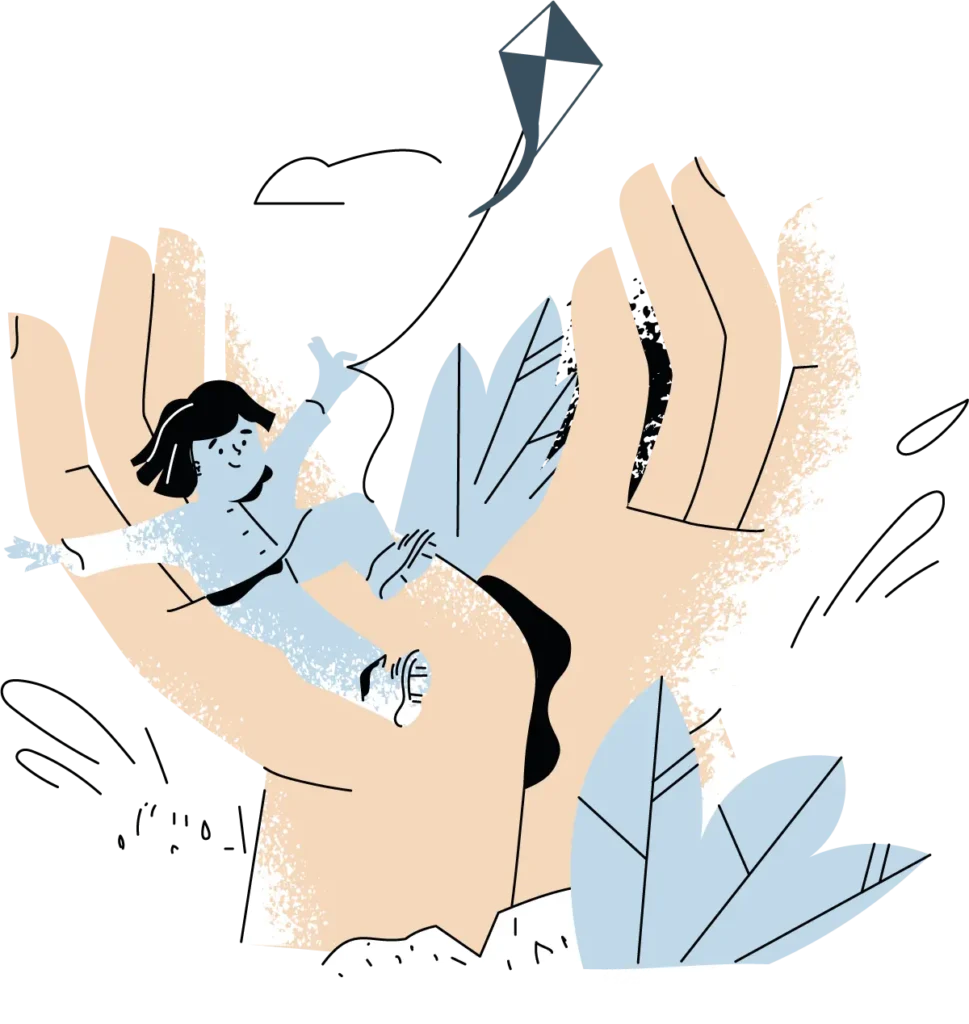Autism in childhood is primarily a disorder of social interaction. Kids with autism struggle to make and keep friends. The main challenge is something called “social reciprocity.” This term means understanding and participating in the give-and-take of social relationships.
Key characteristics of autism
- Deficit in social communication
- Restricted or repetitive interests or behaviors. Autistic kids tend to be hyper-focused on, even obsessed with, certain interests, ideas, or behaviors. These can be called obsessive interests
- Trouble reading and responding to social cues. These challenges show up in several ways, such as poor eye contact or trouble with facial expressions.
- Difficulty with conversation skills.
- Early signs in young children can include significant sleep challenges, and some children may have significant emotional over or under-reactivity (Zwaigenbaum, Brian, & Ip, 2019)
We believe that you, parents, take the first step in understanding and supporting your child. The old adage, “if you have met one autistic kid, you have met one autistic kid,” highlights the wide range of symptom profiles.
Knowing that this disorder is complex and sometimes misunderstood, let’s have a closer look at some of the key markers for autism in childhood. As a parent, these can help you be aware of what autism may look like in your young child. Early diagnosis is a great thing that can lead to more access to supports and services. You can meet the specific needs of your child and family while also celebrating your child’s individuality.
Top 10 Symptoms of Autism in Childhood
Autistic children often show the following characteristics.
#1. They have play skills challenges.
Autistic children do not always play imaginatively or cooperatively the way other children do. They might struggle to take on the part of a doll or an action figure during play. They may prefer more literal or functional play instead of pretending and using their imagination. Kids with autism may need to be reminded to listen to others, play by the rules, or to come join others in a game as they may not easily realize the perspective of others.
#2. They have obsessive interests.
Autistic kids tend to have favorite topics or obsessive interests. They might go on and on about their favorite video game or movie, sometimes inserting quotes from characters into their everyday speech. Interests may be limited to a few special topics. They also may enjoy unusual interests such as air conditioners, car washes, or natural disasters.
#3. They demonstrate abstract language differences.
Autistic individuals might not understand jokes, analogies, or metaphors the same way as neurotypical peers. They may have a tendency to take things more literally. When an adult says, “button your lip,” an autistic child might think, “uh, no, thank you. That would hurt.”
#4. They use advanced vocabulary and early language.
Some autistic kids speak early and use very advanced and formal vocabulary that stands out to adults. These same children may be much better at communicating with adults than they are at communicating with peers.
#5. Autistic children may have a different sense of humor.
Autistic kids often have a hard time with typical humor. Humorous and sarcastic comments are often misunderstood. Kids with autism often have difficulties knowing when people are kidding around. They may become easily offended over casual teasing or comments that are said in gest.
#6. They have voice differences.
Some autistic children sound a little different when they talk. For example, an autistic child might use an even tone, robotic, singsong, or unusually-pitched voice. They may speak very loudly or very softly, making communication difficult.
#7. They use repetitive language.
Some autistic kids enjoy repeating phrases they hear in movies or videos. This symptom is also referred to as ‘scripted language’ or ‘echolalia’. For example, a child might say “to infinity and beyond” after every question on a test. They may even make up their own phrases like ‘tree wreck’ or ‘cat-cow-rock’ that they say over and over again.
#8. Autistic kids may have repetitive behaviors.
Many autistic kids have repetitive behaviors that may be obvious like rocking, hand flapping, and flipping objects. However, these behaviors can be much more subtle. A repetitive behavior could include wiggling one’s pencil, chewing on the sleeves of a shirt, or flipping fingers back and forth ever so subtly.
#9. They may have some sensory sensitivities.
Autistic kids often have sensory sensitivities or differences in sensory processing. For example, they may smell a doll or lick Play-Doh. There may be extreme sensitivities to sounds, textures or smells. Individuals with autism tend to have different sensory perceptive systems. When a child covers their ears or runs away from a sound, this behavior is evidence of sound sensitivity. They may feel quite uncomfortable with certain settings like a concert, party, or school cafeteria.
#10. Autistic kids may have relationship difficulties.
The most significant issue for autistic kids is in developing and maintaining long-term reciprocal relationships. Some younger children with autism do okay socially for a while but start to struggle as relationships grow more complex in upper elementary school or middle school. Reading social cues both verbal and nonverbal like eye contact, facial expression, conversational pauses or comments of disinterest may be hard for an autistic child. Relationships with peers may not go very deep, or last very long, due to social skills difficulties.
A spectrum of traits
Autism is a disability that impacts individuals over a broad spectrum of traits, hence the term Spectrum. Researchers believe that 1 in 59 individuals is identified as autistic (Greening, 2020).
Autism researchers and clinicians seek to affirm diversity. At the same time, they offer education and early invention practices. These opportunities lead to autonomy, daily living skills, relationships, and employment (Eigsti, Girolamo, & Fein, 2022).
How to Help Your Child

If you notice some of these differences in your child, it may be helpful to seek an evaluation for autism. By implementing strategies as needed and by being supportive and understanding of your child’s differences, you can help create a positive and successful environment. Parent education is the first line of treatment for your child. When parents dig in, kids gain skills they need to be successful.
Parents, start learning more about autism
In just minutes a day, learn about the causes and symptoms of autism in your Cadey courses. Learn from Cadey whether your child has any autism symptoms today. When you understand your child’s symptoms, you can help them.
Resources: Autism Research
Eigsti, I.M., Girolamo, T., Fein, D. Neurodiversity and Early Autism. JAMA Pediatr. 2022 Dec 1;176(12):1272. doi: 10.1001/jamapediatrics.2022.4141. PMID: 36315139.
Greening, N. K. (2020). Foundations in Autism Spectrum Disorders and Related Neurodevelopmental Disorders: Possible Causes, Characteristics, Diagnosis, and Treatment. Advances in Social Sciences Research Journal, 7(7) 293-318.
Kroncke, Anna P., & Willard, Marcy & Huckabee, Helena (2016). Assessment of autism spectrum disorder: Critical issues in clinical forensic and school settings. Springer, San Francisco.
Urbistondo Cano, Fran & Simon, Gail (2022). From Autism Spectrum to Multi-Spectra Living. Murmurations: Journal of Transformative Systemic Practice, 4(2), 101-147. https://doi.org/10.28963/4.2.8
Zwaigenbaum, L., Brian, J. A., & Ip, A. (2019). Early detection for autism spectrum disorder in young children. Paediatrics & Child Health, 24(7), 424-432.
Children’s books on social skills
Brown, Laurie Krasny & Brown, Marc (2001). How to be a friend: A guide to making friends and keeping them (Dino life guides for families).
Cook, Julia (2012). Making Friends is an art!: A children’s book on making friends (Happy to be, you and me).
Cooper, Scott (2005). Speak up and get along!: Learn the mighty might, thought chop, and more tools to make friends, stop teasing, and feel good about yourself.


